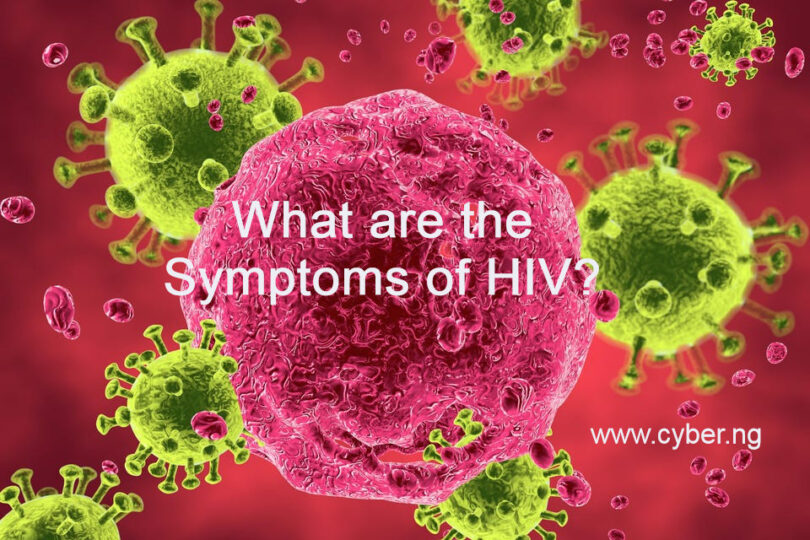Microorganisms, including viruses, have been known to exist probably before men started walking the face of the Earth – some of them helpful, some of them harmful. The HIV virus is one such microbe. HIV infections give much concern because of the way the virus badly damages the immune system, and makes other illnesses difficult to cure. It is therefore essential for any sane Nigerian to watch out for signs of this virus attacking the body, and do everything necessary to prevent the infection. We will briefly discuss the symptoms (and prevention) of the HIV virus in this article. And we urge you to seriously follow our recommendations to avoid getting infected with the dreaded virus.
What is HIV?
HIV (Human Immunodeficiency Virus) is a virus that can cause severe damage to the body’s immune system such that the body is so weakened, that it cannot fight diseases or infections easily. It has been found that the HIV virus may reside in the human body in dormant form (if the virus count, or viral load is small) for quite some time and not affect the patient. But once triggered into action, the virus can multiply to dangerously high levels in the body and develop into the full-blown disease known as AIDS (Acquired Immunodeficiency Virus), with devastating effects on the body and significant loss of weight. The HIV virus actually targets and resides in the white blood cells. The virus is transmitted from person to person through body fluids: semen, blood, and vaginal fluids. So far, antiretroviral drugs that can slow down the progression of both HIV and AIDS in the body have been developed and marketed to the general public under the supervision of HIV control centers around the world.
Between the year 2010 and now, certain vaccines and drugs were developed by researchers to slow down and largely prevent the spread of HIV, so it does not develop into the full version of the AIDS disease. Thus meaningfully helping patients to recover to almost perfect health if the regime is carefully followed. One such recorded case of HIV cure took place in Berlin in the year 2011, roughly four years after commencing treatment. There are also other isolated claims of full reversal of the HIV infection to near-perfect health across the world. Certain other herbal medicine practitioners have also risen up to assert that there are natural cures for HIV and AIDS, though the claim has generated a lot of controversy. Nevertheless, it remains a possibility.
Also Read- How to Use a Pregnancy Test Strip
History & Origins of HIV virus
Some scientific investigations have linked the emergence of the HIV virus to another virus originally found in chimpanzees sometime around the 1930s within Central and West Africa, which was transmitted into the humans that hunted and ate them. And in time, the dreaded virus mutated and started spreading first across Africa; and then the first diagnosed cases were discovered among the gay community in the US around 1982. So far, victims of HIV have included both men and women worldwide, as it is now known to be transmitted majorly through contact with contaminated blood, and through sex. Patients have been known to contact HIV through:
- Unprotected sexual relations
- Mother to child transmission during breastfeeding, child birth or during pregnancy
- Blood transfusions done with contaminated blood
- Unsterilized injection usage
- Other sharp objects such as razor blades, pins, scissors or shaver tainted with contaminated blood
Symptoms of HIV to watch out for
So What are the Symptoms of HIV? If you experience any one of the following symptoms and it persists for more than a few days, please consult a physician immediately for a medical diagnosis. Though these symptoms may be an indication of some other kind of illness, these are the typical signs and symptoms of HIV infection:
- Flu-like symptoms such as fever, chills, fatigue, night sweats, loss of appetite (likely to occur within the first 2 to 4 weeks of infection)
- Swollen lymph nodes (especially around the neck)
- Muscle aches
- Painful abdomen
- Diarrhoea that lasts for over a week
- Vomiting
- Nausea
- Soreness in the throat
- Dry cough
- Memory loss, depression and neurological disorders
- Mouth ulcers or white tongue
- Loss of weight
- Headache
- Pneumonia
- Skin rash
- Red blotches
Also Read- 200+ Happy New Month Messages for Loved Ones
Available HIV Treatments
As said earlier, a number of antiretroviral drugs have been formulated to reverse the symptoms of HIV infection and stamp out the virus from the body, until the viral load becomes so significantly small that the symptoms disappear. Testing positive for HIV is no longer a death sentence. Some of them are herbal remedies, some of them vaccines, and some of them are pharmaceutical drugs or formulations. However, the best place to start is to visit a qualified health care practitioner and run the necessary HIV tests, once a patient notices any of the symptoms above.
The health care practitioner will be in a good position to recommend the right antiretroviral drugs; or even to direct such a patient to an approved HIV/AIDS testing and treatment centre around town. The patient may likely get a free drug called PEP (Post-Exposure Prophylaxis) and other retrovirals at government hospitals and research centres in Nigeria that offer free HIV testing – PEP can prevent HIV infection within 72 hours of exposure to infected persons (especially victims of sexual abuse). Individuals are not advised to carry out self medication.
Prevention of HIV
And yes, HIV infection can be prevented. Two items of useful information here are firstly, HIV/AIDS self-test kits have been created for home use, if you are privileged to get one (though it is claimed not yet to be commonly available in Nigeria). Secondly, there is also the pre-exposure Prophylaxis (PrEP) and post-Exposure Prophylaxis (PEP) drugs available to prevent spread of the virus, and they are effective drugs. These are apart from many brands of medically certified antiretroviral drugs you can obtain from recommended HIV/AIDS treatment centres. In general, for effective prevention of HIV/AIDS infection, follow these simple rules:
- Avoid unprotected sex with random persons. Use a condom and in the correct way.
- Stay faithful to one (sex) partner.
- Sexual abstinence is highly recommended if you do not have a faithful partner.
- Avoid sharing sharp objects with others (such as razor blades, scissors, knifes, shavers etc).
- Get tested and treated for HIV and other sexually transmitted infections.
- Avoid self-medication, especially injection of drugs and other substances into your own body by yourself.








